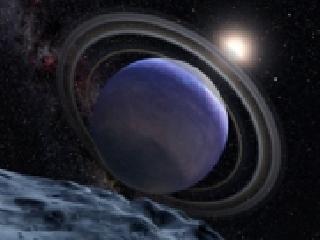
An unrelated photo of an exoplanet. Image credit: NASA
WASHINGTON (BNS): NASA's Kepler space telescope has found 461 new planetary candidates four of which could be in "habitable zone", storing liquid water on their surface.
Acquiring data from observations spanning from May 2009 to March 2011, Kepler has reported the discovery which shows a steady rise in the number of smaller-size planet candidates and the number of stars with more than one planet. The count of such stars now stands at 467 from the previous count of 365.
"The large number of multi-candidate systems being found by Kepler implies that a substantial fraction of exoplanets reside in flat multi-planet systems," according to Jack Lissauer, planetary scientist at NASA's Ames Research Center in Moffett Field, California.
The findings also show a dramatic increase in the number of Earth-size and super Earth-size planets.
Since the last Kepler catalog was released in February 2012, the number of candidates discovered in Kepler data has increased by 20 percent and now totals 2,740 potential planets orbiting 2,036 stars, according to NASA.
The four planets that could possibly be harbouring water are less than twice the size of Earth and orbit in their sun's "habitable zone".
"There is no better way to kickoff the start of the Kepler extended mission than to discover more possible outposts on the frontier of potentially life bearing worlds," said Christopher Burke, Kepler scientist at the SETI Institute in Mountain View, California, who is leading the analysis.
All the new-found candidates require additional follow-up observations and analyses to be confirmed as planets, NASA said. At the beginning of 2012, 33 candidates in the Kepler data had been confirmed as planets. Today, there are 105, it said.
"The analysis of increasingly longer time periods of Kepler data uncovers smaller planets in longer period orbits -- orbital periods similar to Earth's," said Steve Howell, Kepler mission project scientist at Ames.
"It is no longer a question of will we find a true Earth analogue, but a question of when," the researcher added.
 Previous Article
Previous Article Next Article
Next Article













The Indian Air Force, in its flight trials evaluation report submitted before the Defence Ministry l..
view articleAn insight into the Medium Multi-Role Combat Aircraft competition...
view articleSky enthusiasts can now spot the International Space Station (ISS) commanded by Indian-American astr..
view article